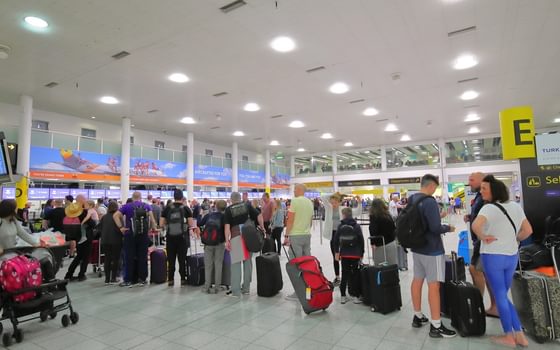Offer £20 first flight discount in package to make flying fairer and reduce emissions, say economists
Report sets out how discount alongside ultra-frequent flyer levy could help reduce flights, cut emissions and raise £6bn
27 May 2025
The government should offer a £20 “first flight discount” to all UK residents as part of a wider package to make flying fairer and cut emissions, according to a new report by the New Economics Foundation and climate charity Possible.
New research finds that despite huge growth in airport capacity over the past two decades, the number of people taking no flights at all in a year has actually increased by over 200,000. Instead, recent growth in air travel has been fuelled by the emergence of the “ultra-frequent flyer”. These are people who take six or more flights per year, mostly for leisure travel, and they are likely to be among the richest in society.
The last government set out plans in its Jet Zero Strategy, backed by scientists and the government’s climate advisory body the Climate Change Committee, to increase the charges levied on airlines for their carbon emissions. But implementation has been slow amid concerns about the impact it would have on the cost of the family holiday.
However, researchers at NEF and Possible have now shown how the government could introduce a package of tax reforms which would reduce emissions and make flying fairer. These policies would protect people’s ability to take their annual holiday or visit loved ones, while also reducing excessive flying by the small group of people who take most flights
The report proposes a £20 discount on an individual’s first flight of the year, alongside a new charge on ultra-frequent flyers and higher taxes on carbon emissions. Overall, the package would protect the family holiday while cutting aviation emissions by 28% by 2030, and raising £6bn a year for the Treasury. The approach would be much fairer than current government policy, curtailing the excesses of the rich while protecting the interests of everybody else.
Dr Alex Chapman, senior economist at the New Economics Foundation (NEF), said:
“We all love going on holiday abroad but at the moment everyone else is paying the price for the richest jet-setters.
“A £20 discount on everyone’s first trip and a tax on sky-high polluters, and on carbon emissions, would help make flying fair.
“It would help protect the family holiday, slash emissions and stop the ultra-frequent flyers from trashing the planet while the rest of us foot the bill.”
Researchers set out how the UK’s current tax system is not aligned with government policy to reduce emissions and encourages environmentally damaging behaviour.
The report describes the emergence of the “ultra-frequent flyer” who flies six or more times a year, or at least once every two months. This group makes up just under 3% of the UK population but takes just under 30% of all UK flights. Researchers have found most of these flights are for leisure, not business.
Alethea Warrington, head of aviation, energy and heat at Possible, said:
“The Chancellor’s claims that expanding flights would be good for the economy really don’t stack up. It’s clear that cutting back on flights to protect the climate wouldn’t harm our economy, and would even help keep spending within the UK. But we need to do that in a way that’s fair, and ensures that the people who fly the most fly less and pay more, without making life more expensive for ordinary people who only fly occasionally.
“Our plan to make flying fairer would ensure that emissions from flights go down, and frequent flyers start paying their fair share. But we’re also calling for a discount on people’s first return flight each year, to ensure that no one is priced out of their annual holiday. This is the fairest way forward, and it would be good for the climate, for our economy and for all of us.”
The report sets out a package of tax reforms which apply the “polluter pays” principle, to which the government has subscribed.
ENDS
Contact
James Rush – james.rush@neweconomics.org
Notes
The report, Flying fair: Modernising the air transport tax system, is available here.
The £20 first-flight discount is sufficient to more than offset the increase in the cost of a short-haul flight which is expected under current government aviation policy, which includes an increase in short-haul carbon taxation worth £1.1bn. The authors of the Flying fair report also propose an increase in long-haul carbon which would raise £3.4bn, a tax on luxury classes of travel which would raise £800m, an ultra-frequent flyer levy which would raise £1.6bn, and the first-flight discount, which would cost £700m. The net impact, if all the above policies were implemented, would be revenue of £6.2bn.
The New Economics Foundation is a charitable think tank. We are independent of political parties and committed to being transparent about how we are funded.
Topics Climate change






